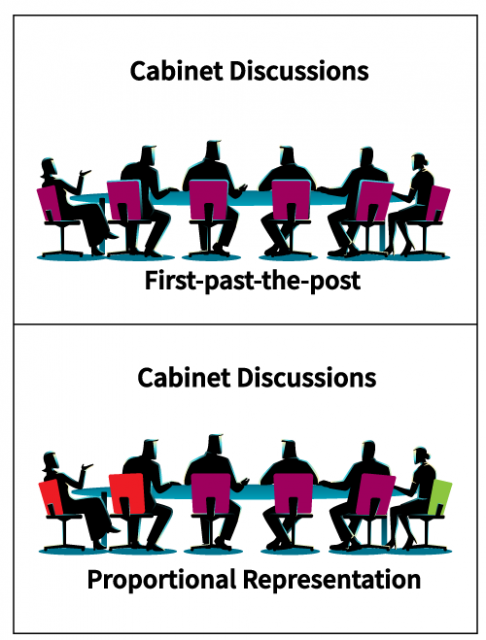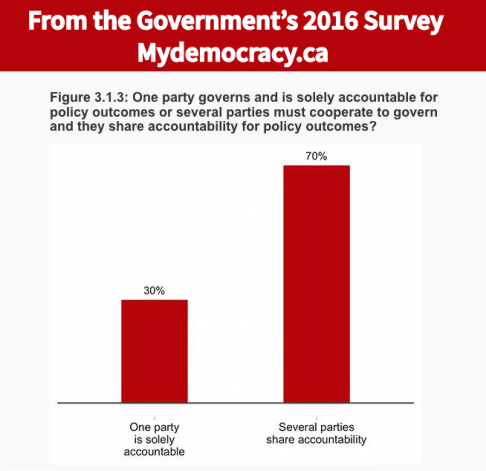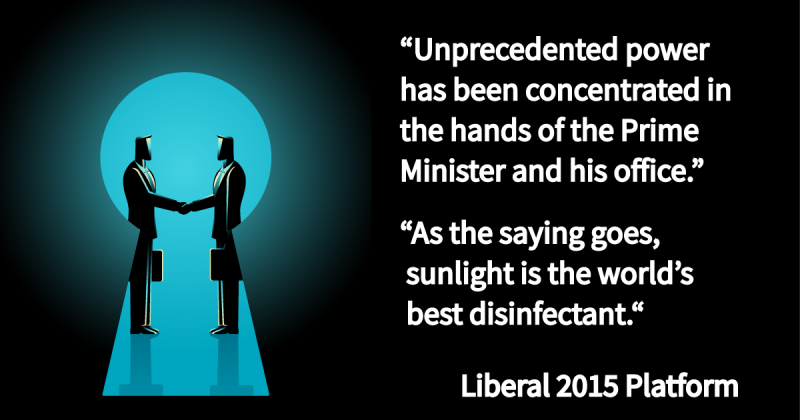Pop quiz: who said this?
Under Stephen Harper, the government has grown secretive and closed-off from Canadians. Unprecedented power has been concentrated in the hands of the Prime Minister and his office.
As the saying goes, sunlight is the world’s best disinfectant.
Full points if you recognize this as coming from the Liberal Party’s 2015 campaign platform: “Openness and Transparency”. Sunny ways, and all that.
In light of the SNC Lavalin affair, one could be forgiven for wondering what’s changed.
The inconsistent messages from the Prime Minister and his (recently resigned) top strategist, Gerald Butts, only serve to intensify the mystery of what really went on in the cabinet and in the PMO.
Voter confidence in Trudeau’s “openness and transparency” credentials is starting to tank.
Trudeau’s broken promise on electoral reform robbed Canadians of a chance for more transparency and accountability
First-past-the-post does one thing exceptionally well – it concentrates power.
Let’s connect the dots between the electoral system and the SNC Lavalin scandal.
In 2015 the Liberals earned 39% of the vote. With first-past-the-post, this gave them 54% of the seats and 100% of the power.
Here’s what this first-past-the-post “landslide” majority meant:
The Liberals write all the bills, no consultation needed
This includes the 500+ page omnibus bill where they stuffed the Remediation Agreement for SNC Lavalin.
Omnibus bills were another thing the Liberals promised to get rid of in their 2015 platform, describing them as a “legislative trick to avoid scrutiny.” The attraction of such a trick must have been irresistible once the Liberals were the ones holding all the cards. According to the Canadian Press, the trick was so effective that SNC Lavalin executives knew about it before most of the MPs did.
Compare this to proportional representation, which Trudeau now claims would be “bad for Canada.”
With proportional representation, the most likely outcome of an election is a majority coalition — the norm in most western democracies. This means MPs of different parties have a hand in drafting or approving legislation.
Coalition agreements between parties are often quite detailed, and available to the public.
One of the main purposes of the agreement is to ensure trust and accountability between partners: a safeguard against one party being able to act secretly, in its own interest.
Relying on two or more parties to jointly craft legislation makes it much less likely that a self-serving clause will sneak its way into a bill.
Only Liberals sit at the cabinet table
 It seems pretty obvious that a cabinet consisting of Ministers from only one party would have a common interest in the political fortunes of that their party.
It seems pretty obvious that a cabinet consisting of Ministers from only one party would have a common interest in the political fortunes of that their party.
With proportional representation, by contrast, there are usually Ministers in the cabinet from different parties. Often even the Justice Minister is from a different party than the Prime Minister.
Imagine how the conversations about what to do about SNC Lavalin might have been different.
The PMO has a lot of power
As Donald Savoie noted in 1999, the power of the PMO has grown over decades, to the point where the the cabinet “no longer operates as a decision-making body, but rather serves as a focus group for the Prime Minister.” The cabinet discusses “matters that the Prime Minister’s officials decide to put on the cabinet agenda — and then the prime minister gets to ‘call the consensus.’”
How could the power of the PMO be different if Parliament was elected by proportional representation?
There will always be advisors close to the Prime Minister, regardless of the electoral system. Helping the Prime Minister retain his (or her) popularity and chances of re-election will always be part of their jobs.
However, would the PMO be able to dictate decisions so easily in a multi-party cabinet?
Would one of these backroom strategists from the Prime Minister’s Office approach a Cabinet Minister from a different party with a proposition that is secretive, ethically dodgy, or serves only the partisan interests of the Prime Minister’s party?
Not unless they wanted to put the coalition’s survival at risk, or see themselves on the front page of the newspaper.
SNC Lavalin had to convince only one party to do its bidding
It’s no secret that lobbyists oppose proportional representation.
In the recent British Columbia referendum, the leader of the NO side was a lobbyist for 17 different organizations. The Urban Development Institute (the Vancouver real estate lobby group) also worked hard to kill reform – some of their members were the major donors to the NO campaign.
Who wants to have to have to convince two or three parties to write government legislation the way you want it? With first-past-the-post, you only have to convince one.
As researcher Salomon Orellana found, proportional representation better “contains elite extraction”, that is, it limits the degree to which powerful economic interests can influence policy to their advantage at the expense of the common good.
Electoral reform can’t be a sideshow this election – let’s make it the main event
If there’s one lesson we’ve learned the hard way, it’s that if there aren’t checks and balances on power, it’s like putting a kid in a candy store with a wad of cash and a promise that they won’t buy anything. We’re setting them (and ourselves) up for failure.
 Canadians recognize that cooperation and shared accountability works. When the Liberal government received the results of their online survey in 2016 – Mydemocracy.ca – right before they dumped their electoral reform promise, they didn’t publicize most of the results.
Canadians recognize that cooperation and shared accountability works. When the Liberal government received the results of their online survey in 2016 – Mydemocracy.ca – right before they dumped their electoral reform promise, they didn’t publicize most of the results.
One of the findings they conveniently ignored was that when asked four different ways, respondents consistently and overwhelmingly supported shared decision-making and shared accountability: the kind of governance Canadians would get with proportional representation.
Since 2017, when Justin Trudeau broke his electoral reform promise claiming there was “no consensus”, he has been making statements like this one:
Canadians will choose whether or not that is a good enough explanation when we come to the next time to vote.
The SNC Lavalin scandal highlights what’s at stake. It’s critical that we choose wisely.

